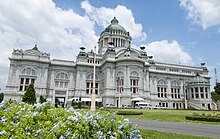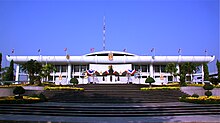1932 to 1972
| This section requires expansion.(November 2013) |
The history of Thailand from 1932 to 1973 was dominated by military dictatorships which were in power for much of the period. The main personalities of the period were the dictator Luang Phibunsongkhram (better known as Phibun), who allied the country with Japan during the Second World War, and the civilian politician Pridi Phanomyong, who founded Thammasat University and was briefly the prime minister after the war. The Japanese invasion of Thailand occurred on 8 December 1941.
A succession of military dictators followed Pridi's ousting — Phibun again, Sarit Dhanarajata and Thanom Kittikachorn — under whom traditional, authoritarian rule was combined with increasing modernisation and westernisation under the influence of the US. The end of the period was marked by Thanom's resignation, following a massacre of pro-democracy protesters led by Thammasat students. Thanom misread the situation as a coup d'état, and fled, leaving the country leaderless. HM appointed Thammasat University chancellor Sanya Dharmasakti PM by royal command. For events subsequent to the abdication of the king, including the name change of 1939, up to the coup d'état of 1957, see Plaek Pibulsonggram.
Thailand helped the USA and South Vietnam in the Vietnam War between 1965–1971. The USAF based F-4 Phantom fighters at Udon and Ubon Air Base, and stationed B-52s at U-Tapao. Thai forces also saw heavy action in the covert war in Laos that occurred from 1964 to 1972.
1973 to 1997
| This section requires expansion.(November 2013) |
See also: History of Thailand since 1973
1997 to 2001
See also: 1997 Constitution of Thailand
The 1997 Constitution was the first constitution to be drafted by popularly elected Constitutional Drafting Assembly, and was popularly called the "people's constitution".[36] The 1997 Constitution created a bicameral legislatureconsisting of a 500-seat House of Representatives (สภาผู้แทนราษฎร, sapha phu thaen ratsadon) and a 200-seat Senate (วุฒิสภา, wutthisapha). For the first time in Thai history, both houses were directly elected.
Many human rights were explicitly acknowledged, and measures were established to increase the stability of elected governments. The House was elected by the first past the post system, where only one candidate with a simple majority could be elected in one constituency. The Senate was elected based on the provincial system, where one province could return more than one senator depending on its population size.
The two houses of the National Assembly have two different terms. In accordance with the constitution the Senate is elected to a six-year term, while the House is elected to a four-year term. Overall the term of the National Assembly is based on that of the House. The National Assembly each year will sit in two sessions: an "ordinary session" and a "legislative session". The first session of the National Assembly must take place within thirty days after the general election of the House of Representatives. The first session must be opened by the king in person by reading a Speech from the Throne; this ceremony is held in the Ananta Samakhom Throne Hall. He may also appoint the crown prince or a representative to carry out this duty. It is also the duty of the king to prorogue sessions through a royal decree when the House term expires. The king also has the prerogative to call extraordinary sessions and prolong sessions upon advice of the House of Representatives.
The National Assembly may host a "joint-sitting" of both Houses under several circumstances. These include: The appointment of a regent, any alteration to the 1924 Palace Law of Succession, the opening of the first session, the announcement of policies by the Cabinet of Thailand, the approval of the declaration of war, the hearing of explanations and approval of a treaty and the amendment of the Constitution.
Members of the House of Representatives served four-year terms, while senators served six-year terms. The 1997 People's Constitution also promoted human rights more than any other constitution. The court system (ศาล, san) included a constitutional court with jurisdiction over the constitutionality of parliamentary acts, royal decrees, and political matters.




0 comments:
Post a Comment